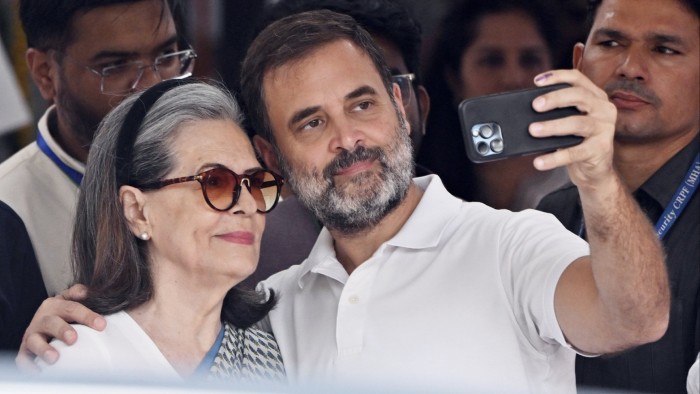Unlock the Editor’s Digest for free
A New Delhi court will this week hear a long-running case over alleged financial improprieties by Rahul Gandhi and Sonia Gandhi that has potentially far-reaching implications for the opposition Indian National Congress.
The case against two of India’s most prominent and polarising opposition politicians — and the possibility of a rare court appearance — has stoked feverish discussion and allegations of political interference by Prime Minister Narendra Modi’s ruling party.
The Enforcement Directorate, India’s financial crime agency, in April charged several people connected with the Congress party, including the two Gandhi family members, with alleged money laundering and misappropriation of funds. The charges carry a maximum punishment of seven years in prison.
The probe was first opened 13 years ago, but last week the Rouse Avenue District Court hearing the case ordered the accused to appear in person in court for the first time since the charges were filed.
The Gandhis have denied any wrongdoing.
Rahul Gandhi is India’s opposition leader and a leading Modi critic. He led a spirited but unsuccessful campaign to unseat the thrice-elected prime minister in last year’s lower house election.
Sonia Gandhi, an upper house MP, is Rahul’s mother and the widow of the former prime minister Rajiv Gandhi. The family is admired by supporters of the centre-left Congress party, which ruled India for decades after independence, producing six prime ministers, but it is reviled by Modi’s camp for what they say is its record of misrule.

The party has denounced the charges as a “vendetta in legal disguise” aimed at silencing the opposition. A Congress party spokesperson did not reply to a request for comment.
The case was filed in 2012 by Subramanian Swamy, a politician affiliated with Modi’s Bharatiya Janata party, under a provision in Indian law that allows private individuals to bring criminal complaints before a magistrate.
Swamy accused the Gandhis of misappropriating funds and seizing land through Young Indian, a company that acquired Associated Journals Limited (AJL), publisher of the National Herald, a Congress-aligned English-language newspaper.
The politician’s complaint alleged that the Gandhis used Young Indian as a “sham” to convert public money to personal use.
Swamy claimed that AJL took an interest-free loan of Rs902.5mn (now $10.7mn) from Congress, which it allegedly failed to repay. Instead, the loan was transferred to Young Indian, a private limited company formed in 2010 of which Rahul Gandhi was the director and Sonia Gandhi later joined the board. The loan transfer allowed the company to acquire AJL’s assets, Swamy claimed.
India Business Briefing
The Indian professional’s must-read on business and policy in the world’s fastest-growing big economy. Sign up for the newsletter here
Two of the other defendants are Sam Pitroda, a Congress party member, and Suman Dubey, a Gandhi family friend. Another two have died since the case was opened. Pitroda and Dubey have both denied wrongdoing.
The Modi government has in the past faced accusations by Congress and other opposition groups of misusing investigative agencies to put pressure on its political opponents.
Arvind Kejriwal and Hemant Soren, two prominent opposition leaders, spent time in prison last year in separate corruption cases in the run-up to the election. Both men have been released on bail, though their cases are ongoing.
“Rahul Gandhi is the leader of the opposition,” said Asim Ali, an independent political analyst. “I don’t think they want to send him to jail, but I think they will keep this case on the boil.”
Modi’s BJP did not immediately respond to a request for comment, but its officials have in past said the judiciary was acting independently in the money laundering case and rejected claims they were pursuing a political agenda.
Gandhi was convicted of criminal defamation in a separate case in 2023 and sentenced to two years in prison for suggesting in 2019 that people with the surname Modi were “thieves”. The verdict also disqualified him from serving in parliament.
The Supreme Court later stayed the conviction, which Gandhi had described as politically motivated, allowing him to reclaim his seat.

